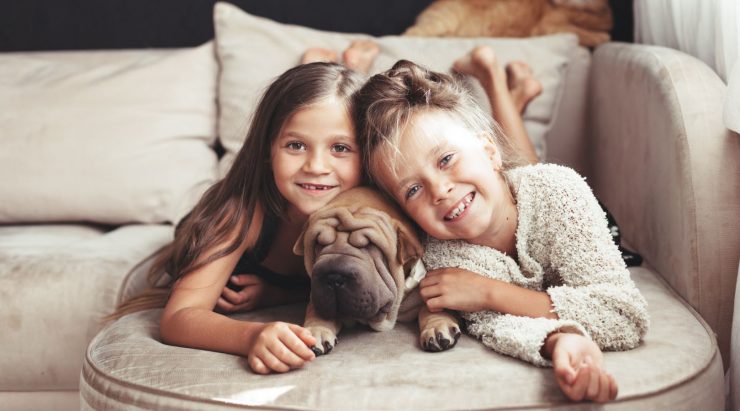Whether you’re a pet owner expecting a child or a parent considering adopting a pet, you may be concerned about how the two parties will get along. While pets and children can build extraordinary friendships, it’s essential to consider the safety of both your pet and your little one.
Becoming pet owners
Before adopting or purchasing a pet, it’s important to consider your family’s lifestyle, schedule, and potential pet’s needs. Certain pets will inevitably be more demanding than others.
If your child is old enough, have them join your family’s discussion. You should discuss expectations with your children and plan how you’ll manage everyday care like feeding and walking.
It’s also important to note that — although your children can lend a hand in taking care of your pet — you, as the parent, will be overlooking the animal’s care. This is especially crucial when your children are infants or toddlers, as they aren’t mature enough to manage their emotional impulses. As always, you’ll act as a role model for your little one, showing them how to look after your pet properly.
Types of Pets
Dogs
If you’re looking to adopt a dog, you’ll have to consider the amount of exercise that they’ll need. Walking your dog can be a great form of physical activity for everyone, but not all families will be able to manage this. Another factor is your dog’s age, as puppies tend to be more active, and older dogs may have a lower tolerance for children.
Cats
Many families also choose to adopt cats. Certain cats spend more time outdoors, whereas others live strictly indoors. Just like dogs, you’ll want to consider your cat’s age as this will affect their compatibility with your family. Be sure that someone is responsible for regularly cleaning the litter box.
Exotic animals
Pet care may be more demanding for exotic animals, such as reptiles and hedgehogs, as many of them require a specific environment. Generally, these pets are less child-friendly because they aren’t as interactive and simple to look after. Caring for Kids suggests that you wash your hands immediately after handling any reptile as they can carry Salmonella.
Fish
Fish are an ideal beginner pet for children, as they require much less attention than other common pets. Your regular tasks will include changing the tank or bowl’s water, feeding your fish, and maintaining an appropriate temperature and environment. If your family has access to a filtered fish tank, you won’t even have to deal with water changes.
Training your Pet
Depending on your pet’s age, they may or may not have received prior training. Additionally, they might require some time to adjust to being around children. Ideally, you should teach your pet basic commands so that they’re well-behaved in different environments and around people. If your child is old enough, they can also learn these commands and contribute to the training process.
Safety and Boundaries
To ensure the safety of your little one and your pet, enforce safety rules to ensure both parties are comfortable. For instance, you can use either a baby gate or a pet crate to allow your pet and children to have separate spaces. Further, you should remind your children to respect your pet’s space. If your pet’s asleep, it’s a good idea to let them rest. Of course, you should always be supervising these interactions. You can model positive interactions with your pet.
Remember that a pet’s reaction to loud noise will be different depending on what type of animal you own, their age, their history, and other factors. Dogs will likely be more receptive to high energy than cats, for example.
Benefits of Having a Pet
A pet can be a great addition to many families; it’s all about ensuring that you’re compatible. Some benefits of pet ownership include increased physical activity, positive emotional development, practicing boundaries, and learning values like responsibility.
Pets can bring comfort to your entire family, not just your children. Their presence teaches your child to respect other beings around them while providing companionship. Pet ownership can also be a great way to enforce a healthy routine in your household.
According to What to Expect, experts claim that kids who have pets “are less likely to develop common allergies” as they’re exposed to certain bacteria at a young age. Additionally, those who own pets tend to get sick less often than others.
References:
Children and pets: Tips for bringing a pet into your home
Written by: Alicia Chow
Check our other blog: 6 Tips for Managing Work and Motherhood





 Invitez familles et amis à assister à cet événement mémorable de votre grossesse. Célébrez avec vos proches où qu’ils soient dans le monde ce moment spécial de lien avec l’enfant.
Invitez familles et amis à assister à cet événement mémorable de votre grossesse. Célébrez avec vos proches où qu’ils soient dans le monde ce moment spécial de lien avec l’enfant. Rien n’est plus beau que les battements de cœur de votre bébé. Enregistrez ce son pour toujours dans un Ourson Coup de cœur de UC Baby®. Il ne s’agit pas simplement d’un beau souvenir, mais aussi d’un moyen efficace qui apaise votre bébé pour l’aider à s’endormir.
Rien n’est plus beau que les battements de cœur de votre bébé. Enregistrez ce son pour toujours dans un Ourson Coup de cœur de UC Baby®. Il ne s’agit pas simplement d’un beau souvenir, mais aussi d’un moyen efficace qui apaise votre bébé pour l’aider à s’endormir.

